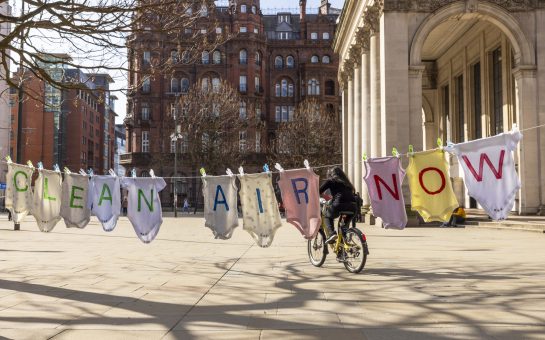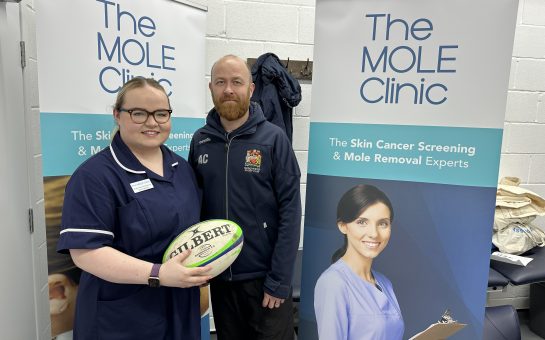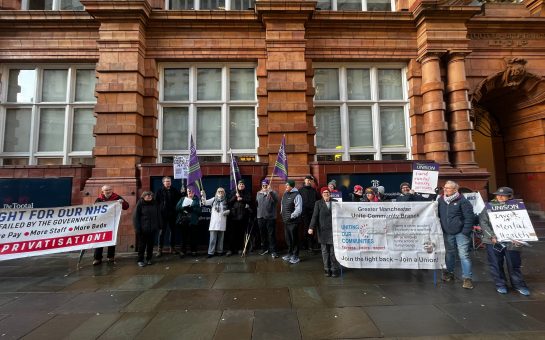The future of the NHS is threatened by reforms being pushed through by the government, warned junior doctors who attended a rally in Manchester on Saturday.
With strike action set to go ahead on Tuesday over changes to junior doctors’ contracts, they said they fear the reforms will pave the way for the eventual privatisation of healthcare.
Max Thoburn, a junior doctor who currently works at Manchester Royal Infirmary (MRI), told MM that medical staff have ‘grave misgivings’ about the government’s decisions regarding the NHS.
“They don’t make any sense unless somebody is essentially trying to run the NHS into the ground and bring in more and more privatisation,” he said.
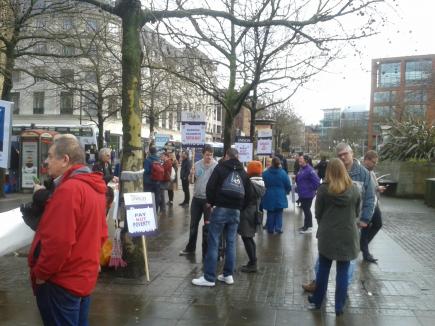
DOCTOR MEET: Members of public meet junior doctors to talk about the future of the NHS
The British Medical Association (BMA) recently announced that three strikes would take place after an impasse was reached in negotiations over junior doctors’ contracts.
According to the government, the changes would make the contract fairer for doctors and improve patient safety by creating a ‘seven-day NHS’.
However, the BMA claims the government has failed to take doctors’ concerns seriously, and the deal would be bad for both patients and junior doctors in the long term.
The proposed changes would lead to a reduction in the number of ‘unsociable hours’, which attract a pay premium, and an extension of normal hours paid at a basic rate.
While the basic pay rate would rise by 11%, normal working time would be extended by three hours on weekday evenings and include Saturdays from 7am until 7pm.
Speaking at a ‘Meet the Doctors and Nurses’ event following Saturday’s rally, Max explained that one of the main concerns the junior doctors have regards out-of-hours monitoring.
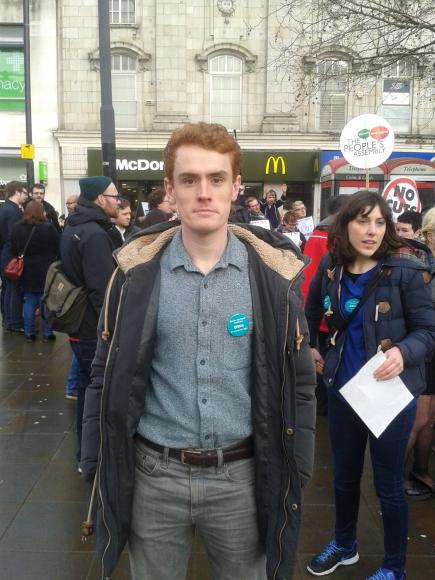
MEET MAX: He argues that the government’s decisions seem to be privatising the NHS
“As a doctor, you’re scheduled to work a certain number of hours that doesn’t necessarily correspond to how many hours you actually work in practice,” he said.
“If it gets to 5 o’clock and there are still three or four patients to see, you still need to treat them, so basically if you end up being understaffed, which the NHS often is, then you often have to work the hours out of goodwill, basically.
“But then that gets monitored, and if you’ve been working extra hours, the NHS trust gets penalised and then you get compensated for the extra hours you work.
“There’s a horrible idea that the politicians have been putting about that somehow this is encouraging junior doctors to work extra hours to get this extra money, which I assure you is not the case.
“As a colleague of mine said to me the other day, there are times when they would have paid quite happily to go home on time, let alone deliberately work the extra hours, but they just feel they’re duty-bound to do that.
“By taking away those safeguards from the hours monitoring and stopping penalising the trust for making people work extra hard, there’s no stopping them.
“They can just understaff the rotas, we’ll cover it through goodwill, and then you’ll end up getting treated by a doctor that has worked however many extra hours.
“The second issue we have is defining Saturday as normal working hours, because the fact is we don’t see it that way.
“I appreciate that lots of people do work weekends – and we do work weekends – but the job we do at the weekend is generally significantly harder.
“It’s much busier at the weekend, so we think that it’s fair to be paid more to reflect that.”
Mary Gee, a junior doctor from Birmingham who also works at MRI, said one of the main concerns they have is the impact that the longer working hours could have on patient safety.
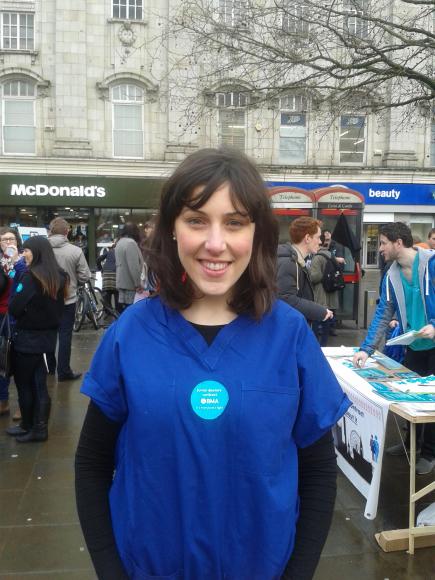
MEET MARY: Longer hours means that more patients are at risk
“I came into this job knowing it would be hard work. I like that it’s hard work; I like looking after sick patients in the middle of the night – that’s why I do it,” she said.
“But there are times when you feel so exhausted, after you’ve done a run of nights or a run of days followed by nights, and you’re aware that you could be on the edge of making a mistake, and you’re probably not delivering the kind of efficient care that you should be giving.
“It’s dangerous, and it impacts on patients’ safety. Now to think there’s going to be a contract that comes in where doctors are going to be spread even more thinly is frankly very dangerous.”
Along with the impact on patient safety, Mary fears the reforms could take their toll on doctors’ private lives.
“What they’re saying is 7pm on a Saturday is the same as 9am on a Tuesday, and find me a nursery that is open at 7pm on a Saturday,” she said.
“Lots of doctors are married to other doctors, nurses or other healthcare professionals, and if you’re doing night shifts it’s incredibly hard to get cover.
“The regularity with which you do night shifts and weekend shifts means that to get childcare is near-on impossible, and it’s hugely expensive.
“It’s an incredibly emotionally draining job, where there’s a lot of risk that you’re constantly managing.
“We live in a litigation era and we’re aware of that all the time – that every decision you make you could get sued over – so you need some time off.”
The doctors expressed reservations about how the dispute has been handled by the government and the secretary of state for health, Jeremy Hunt.
Mr Hunt has argued that the current arrangements are unfair for patients, who are 15% more likely to die if they are admitted to hospital on a Sunday compared with a Wednesday.
However, Max claimed that the data behind the argument is ‘hugely flawed’.
“It actually says in the paper that Sir Bruce Keogh wrote that to use this data to imply that we need better staffing levels would be rash and misleading,” he said.
Mr Hunt recently came under fire when it emerged his officials had ‘toughened up’ a letter from Sir Bruce to the BMA asking what would happen if a junior doctors’ strike coincided with a terrorist attack.
Max said one of the main aims of the Meet the Doctors and Nurses events is to counter the government’s spin by engaging directly with the public.
“At the end of the day, we’ve got nothing to hide. We want to have an open and honest conversation with people and we want to tell them the facts.
“The government have got the power of the mass media; they’re going to influence it; they’re going to spin it how they want.
“Somehow, the letter implied that doctors, if there was a terrorist attack, wouldn’t come in because they’d be striking.
“The interesting thing was they were having a doctors’ strike on the day of the Paris attacks, and all the doctors came in to help – of course they did, and we know that we would, too.
“Not only did they write this letter in the first place, they tried to make it worse and worse and drive home this point, and I think we all knew this was going on – the spin machine – and that’s why we’ve got this event, to try and combat it.”
“The reaction from the public has been fantastic. There have been people who’ve come and said, ‘oh, you’re overpaid’, and then by the time they leave they’re signing a petition in support, and it’s lovely to see.”
The industrial action is also being held as a protest against the government’s plans to scrap bursaries for healthcare students and replace them with loans.
Beth Byrom, a final-year student in mental health nursing at the University of Salford, said this could have a big impact on students’ finances.
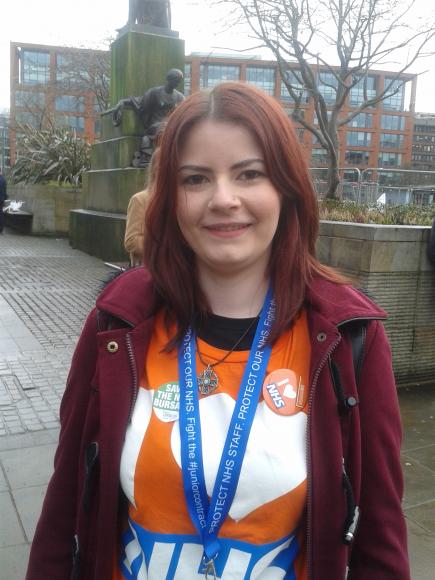
MEET BETH: Worried about student finances being impossible to pay back because of low salary
“They’re arguing that it will give students more money day to day, which obviously is helpful, but in the long run it’s quite harmful, because the starting salary of a nurse is so low that the repayments are going to take forever.
“Not only that, there’s a pay freeze on healthcare salaries to a 1% per year pay rise, so it’s not rising with the rate of inflation.
“The bursary is such a lifeline for so many students. We don’t have time to work part-time around our degree, we’re in placement for 40 hours a week upwards, we’re in university full-time, we’ve got assignments on our hands and documentation to do, so it is impossible, really.
“Everybody who I know is on the bursary. And because I’m on the master’s programme there’s no loan funding for it, so I really wouldn’t have been able to do this course at all. That bursary is my rent, my food, my bills, my travel…”
The doctors fear that the combined impact of these reforms could deter people from joining the medical profession at a time when it is already facing a recruitment crisis.
Mary said: “I can see there will be a reduction in the amount of applications to medical school. I think it’s going to be hard to retain nurses because the bursary will be going now, and A&E already has a massive recruitment crisis.
“If you put in a contract that is less safe than the one we’ve already got, the situation is just going to be exacerbated. It’s bad for the country, this contract.”
The doctors were adamant that strikes were decided on as a last resort and stressed that emergency care would still be available.
Mary expressed sympathy for the people who have had treatment postponed as a result of the industrial action.
“It is inconvenient for them and we are sorry about any outpatient operations that have been cancelled,” she said.
“We feel like we’ve been backed into a corner. Jeremy Hunt has the power to put forward a safe contract that we don’t have to strike on.”
Ultimately, Max, Mary and Beth are concerned that the future of the NHS could be threatened by the effects of these reforms, which could lead to more privatisation.
“These issues of privatisation are not a new thing,” Max said. “This has been going on since Thatcher’s time – she started off by privatising the cleaners – and it certainly doesn’t exclude the New Labour governments, who furthered it.
“So it’s not just this government, but these attacks do seem to be getting more and more frequent.
“We want to make clear that it’s not just about us; it’s about a real battle for the NHS, essentially. We want to make sure that it’s still here for generations to come. I want it to be there for my children and my grandchildren.”
Image courtesy of Garry Knight, with thanks.
